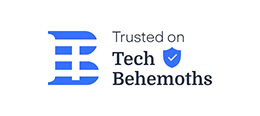Many website owners are never concerned about their site’s security. They consider it only when their website gets hacked. Therefore, it is necessary for all of us to take our website’s security very seriously. It becomes imperative for us to keep our site protected and secured from hackers and malicious attacks.
We know that WordPress is one of the most user-friendly CMS and blogging platforms. That means you don’t need to be a technical expert while using this popular CMS platform. And, this is why WordPress has become a soft target for hackers and spammers.
According to the Survey, Over 70% of WordPress installations are vulnerable to hacker attacks. This shows that our WordPress website is in a risk and the time has come to take strict steps to improve the overall security of a website.
In this blog, we will go through the simple 10 tips that can help you make your WordPress site or blog, safe and secure.
1. Choose a Reliable Hosting Provider 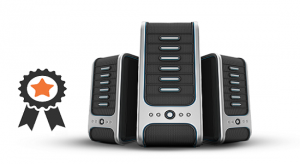
Secure hosting enables your website to be accessed by using the HTTPS protocol that encrypts the data transferred between a visitor’s web browser and your site. Therefore, it is important for you to choose a reliable web hosting provider that can give you the most secure hosting services.
Do your research and find out the best company that has a good track-record for strong security measures.
2. Consistently Update your WordPress Site 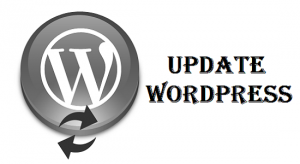
The WordPress updates or new versions of WP are designed with an objective to fix bugs and issues. Every new release contains fixes and patches that notice real or potential vulnerabilities. If you don’t keep your site updated with the latest version of WordPress, then your site could be more vulnerable to attacks.
Most of the hackers will intentionally hack older version of WordPress with familiar security issues. Therefore, it is necessary for you to update your website, update your themes and plugins with the latest versions on a regular basis. With the updates, you can fix the security vulnerabilities and keep your site secured from hackers.
3. Use Strong Passwords 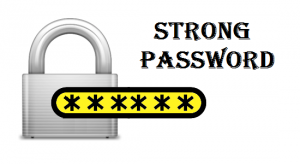
Around 9% of WordPress sites are hacked due to weak passwords. If your WP administrator password is something like ‘abc’ or ‘123’, then you have to change because it becomes easy for hackers to break such passwords. It would be better for you to use strong and secure passwords.
Use a password that is easy to remember, but difficult to crack. Through this, you can keep your site protected from the unwanted hackers.
You can also use a Password manager such as LastPass that can help you remember all your passwords. But, if you use this, make sure your master password is strong and secure.
4. Don’t use “admin” as your Username
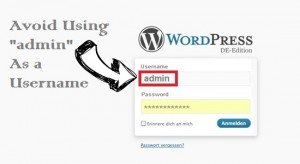 In recent past, there was a spate of brute-force attacks launched at WP websites all around the web, consisting of repeated login attempts by using the username “admin” with the combination of some common passwords.
In recent past, there was a spate of brute-force attacks launched at WP websites all around the web, consisting of repeated login attempts by using the username “admin” with the combination of some common passwords.
So, if you are using “admin” as your username alongside a weak password, then your website could be open to a malicious attack. Thus, it is recommended to change your username to something less popular.
With the introduction of version 3.0, you can independently choose your own username. But, many owners are still using “admin” as their username because it is easy to remember. Some web hosts also utilize auto-install scripts that still create an “admin” username by default.
Well, you can fix this by creating a new administrator account by using the unique username, logging in as that new user and delete the original “admin” account.
5. Disable Your Username from the Author Archive URL 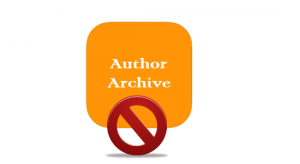
A hacker has the potential to attack your username through the author archive pages on your website.
WordPress by default shows your username in the URL of your author archive pages. For example, if your username is xyz, then your archive page would be like:
http:/yoursure.com/author/xyz
So, it would be better for you to hide your username from the author archive URL.
6. Confine Login Attempts 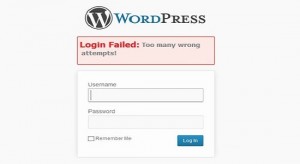
If a hacker is continuously attempting a brute-force attack to unlock your password, it can be beneficial to confine the number of failed login attempts from a particular IP address.
Through this process, you can specify how many tries will be allowed and how long an IP address will be discarded after too many failed login attempts.
However, many professional attackers use a large number of different IP addresses but still, limiting login attempts is worth to keep your site protected from malicious activities.
7. Disable File Editing through the Dashboard
In a default WordPress admin panel, you can go to Appearance > Editor and edit any of the theme files in the dashboard. But the problem occurs if a hacker managed to get into your admin panel, then he could also edit your files and execute any random code they wanted to. Thus, it is better for you to disable the file editing by adding the following to your wp-config.php file:
define( ‘DISALLOW_FILE_EDIT’, true );
8. Avoid Using Free WordPress Themes 
WordPress offers thousands of intriguing free themes that can make your site look outstanding. But, it would be good to avoid using free themes, especially, if they are not developed by a reputed developer.
If you want to use a free theme, you can choose a trusted theme company that can provide you high-quality free themes. You can also choose a theme that is available on the official WordPress.org theme repository.
The same method applies to plugins as well. You can use free plugins that are included on WordPress.org, or developed by a reputed developer.
9. Backup your site 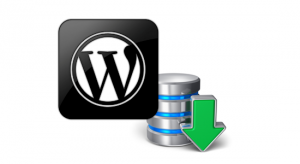
Backups are extremely important because it keeps all the content of a site protected. We can say this is the best security measure from your end as you never know when something abruptly could happen that might leave your site open to a malicious attack. If your site gets hacked, you want to make sure that all your content is backed up so that you can simply restore your site. In the WordPress Codex, you can find how to backup your site. In fact, you can also use a plugin like WordPress Backup to Dropbox to generate regular automatic backups.
10. Use WordPress Security Plugins
With the use of Security plugins, you can easily improve your WordPress site’s security and reduce the chances of being hacked.
There are some popular Security plugins:
1. iThemes Security – It protects your site by hiding important areas from it. This plugin also protects access to essential files.
2. BulletProof Security – It protects your website through .htacccess.
3. All In One WP Security & Firewall – A collective, user-oriented, all in one WP security and firewall plugin for your website. It adds a firewall to your site.
4. Wordfence Security – It is a full-featured security plugin.
5. Exploit Scanner – It searches your database for any distrustful code.
Wrapping Up
In this blog, we discussed the 10 easy ways that can help you improve your WordPress site’s security. In order, to protect your site from the hackers and spammers, follow these simple tricks.
Author Bio: Tracy Jones works for WPGeeks Ltd. as a WordPress Developer. She is an expert in converting HTML to WordPress theme with guaranteed 100% client satisfaction. She enjoys her writing and loves to share her knowledge through tutorials. Follow her company on social media networks like Facebook and Google+

